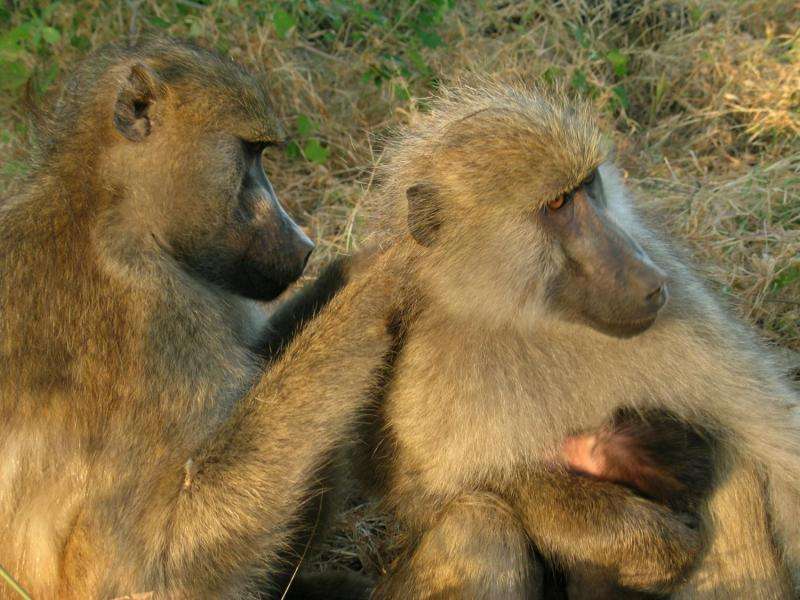Having well-connected friends benefits female baboons, study finds

In humans, it's well documented that having a healthy social life is associated with better physical health. The same is true for baboons: females who have close bonds with other females live longer and have greater reproductive success.
In a new study published in Royal Society Open Science, Dorothy L. Cheney and Robert M. Seyfarth of the University of Pennsylvania and Joan B. Silk of Arizona State University took a closer look at those "friendships" between female baboons to understand what types of bonds rendered the greatest benefit. Using social network analysis to probe a massive dataset of wild baboons' social interactions collected during several years in Botswana's Okavango Delta, they found that females reaped the greatest benefit from friendships with individuals who themselves had close, stable bonds with other females in the group. Having these types of friendships was associated with greater offspring survival.
"There seems to be a strong selective pressure for close, same-sex friendships in these baboons," said Cheney, professor of biology in Penn's School of Arts & Sciences. "You can easily imagine that, if you have a friend who herself has a lot of other close friends, you're indirectly connected to them and could derive benefits from those connections."
Cheney and Seyfarth have conducted field research on wild baboons in the Okavango Delta since 1992, amassing an intimate, data-driven portrait of the social life of the group.
"The constraint on this type of social network analysis is that it takes years and years to collect the data," Cheney said. "A baboon doesn't have her first baby until she is 6 or 7, so to really watch them over generations takes a very long time."
Their observations included documenting behaviors that indicated a close bond, such as grooming each other or being in close proximity with one another. Females typically form close bonds with only a few other females.
Earlier research by Cheney, Seyfarth and Silk had demonstrated that having close social bonds—more so than having a high social rank—enhanced longevity and reproductive success, as measured by the likelihood of offspring survival, in wild baboons.
To explore more deeply which bonds were the most valuable, they used behavioral data that had been intensively collected from 49 females of known age and reproductive history, to perform a social network analysis on the group. The analysis assessed the strength of bonds between pairs of friends as well as other measures, such as the tendency for a female to be part of a "clique," in which females may only be bonded to other females in a closed group, or, in contrast, the extent to which an individual was friends with females who were connected to other females in the group. They then assessed the relative importance of these network measures by seeing which network measures best predicted whether a given female's offspring survived.
They found that baboons with well-connected friends—that is, those who had close relationships with females who themselves had other close friendships within the group—had the highest offspring survival.
"From this analysis, it looks like being a member of a small, closed clique is not as advantageous as having best friends who themselves have very good friends outside a female's social circle," Cheney said.
Raising offspring to adulthood is not an easy task for baboons. Some of it comes down to luck, such as avoiding lions and hyenas that roam the area. But Cheney speculated that having well-connected friends could cushion the blow of losing a close friend.
"Even if your network was damaged by losing your best friend, if your best friend had a lot of close connections, it might make it easier to facilitate a new friendship with those individuals."
Cheney and Seyfarth hope to continue investigating the social and cognitive lives of baboons, studies that can also shed light on the habits and motivations of another highly social species: humans.
More information: Dorothy L. Cheney et al. Network connections, dyadic bonds and fitness in wild female baboons, Royal Society Open Science (2016). DOI: 10.1098/rsos.160255
Journal information: Royal Society Open Science
Provided by University of Pennsylvania



















